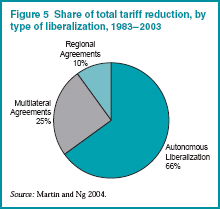Fareed Zakaria in How To Change Ugly Regimes and Leon Hardar in Trading, Not Invading: US Hums Different Tune on Vietnam understand what Robert Scheer and Robert Wright understand, that which apologists for the invasion of Iraq and some of its anti-market opponents do not understand. Zakaria:
I realize that it feels morally righteous and satisfying to “do something” about cruel regimes. But in doing what we so often do, we cut these countries off from the most powerful agents of change in the modern world—commerce, contact, information. To change a regime, short of waging war, you have to shift the balance of power between the state and society. Society needs to be empowered. It is civil society—private business, media, civic associations, nongovernmental organizations—that can create an atmosphere which forces change in a country. But by piling on sanctions and ensuring that a country is isolated, Washington only ensures that the state becomes ever more powerful and society remains weak and dysfunctional. In addition, the government benefits from nationalist sentiment as it stands up to the global superpower. Think of Iraq before the war, which is a rare case where multilateral sanctions were enforced. As we are discovering now, the sanctions destroyed Iraq’s middle class, its private sector and its independent institutions, but they allowed Saddam to keep control.
Bush and some of his most virulent opponents have a different understanding: markets must be spread by force, because markets are good and because markets are evil respectively.

